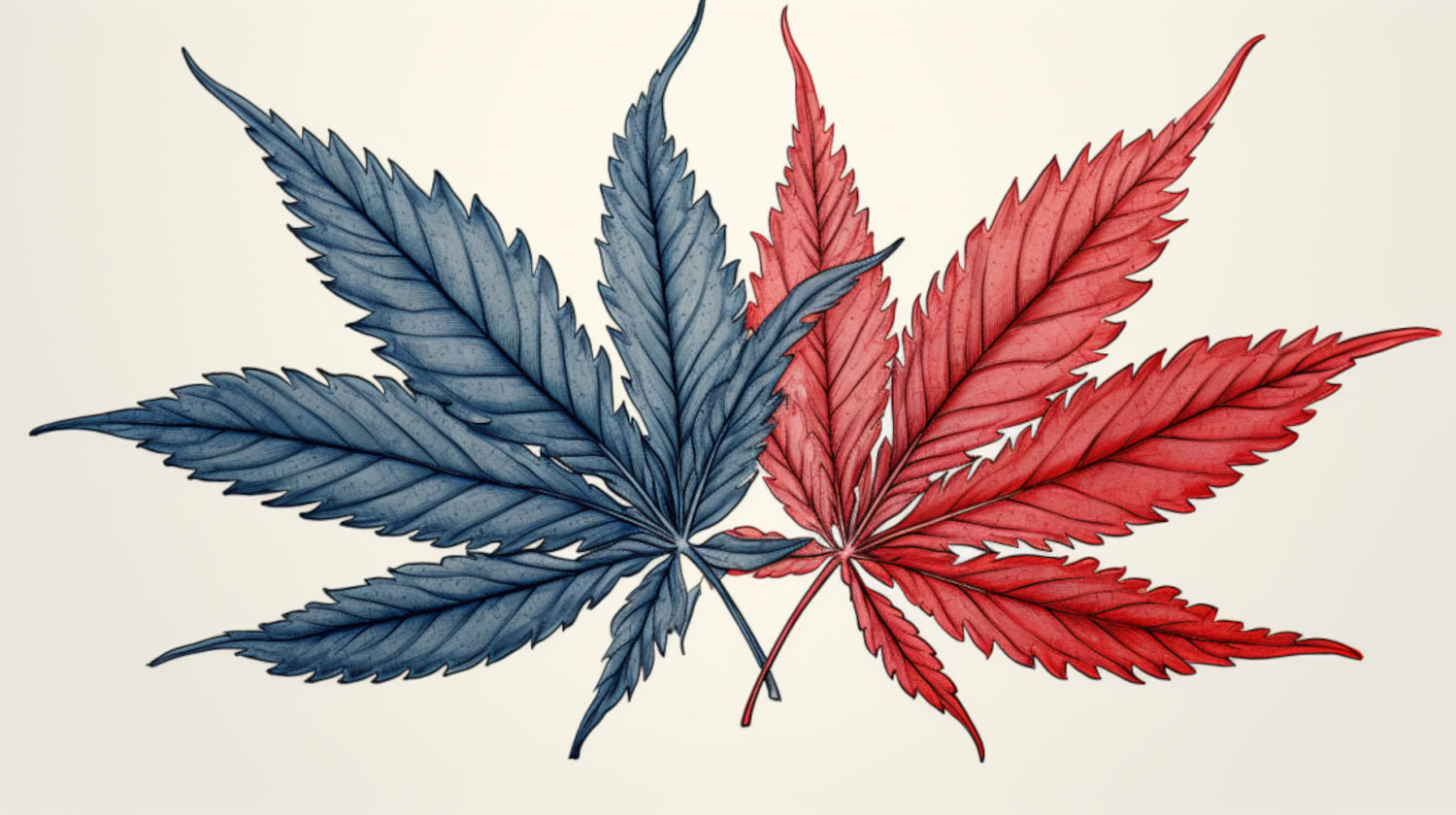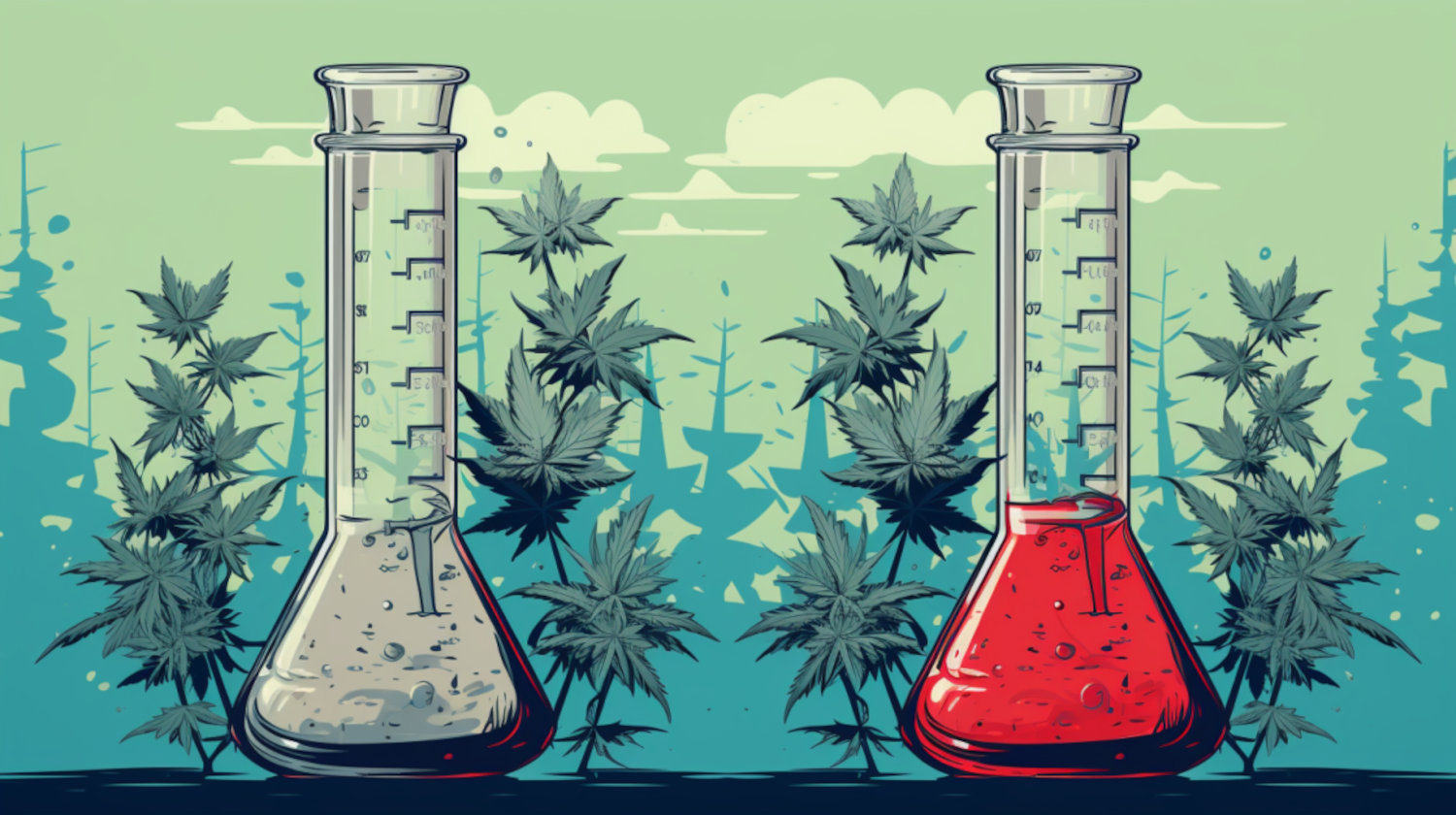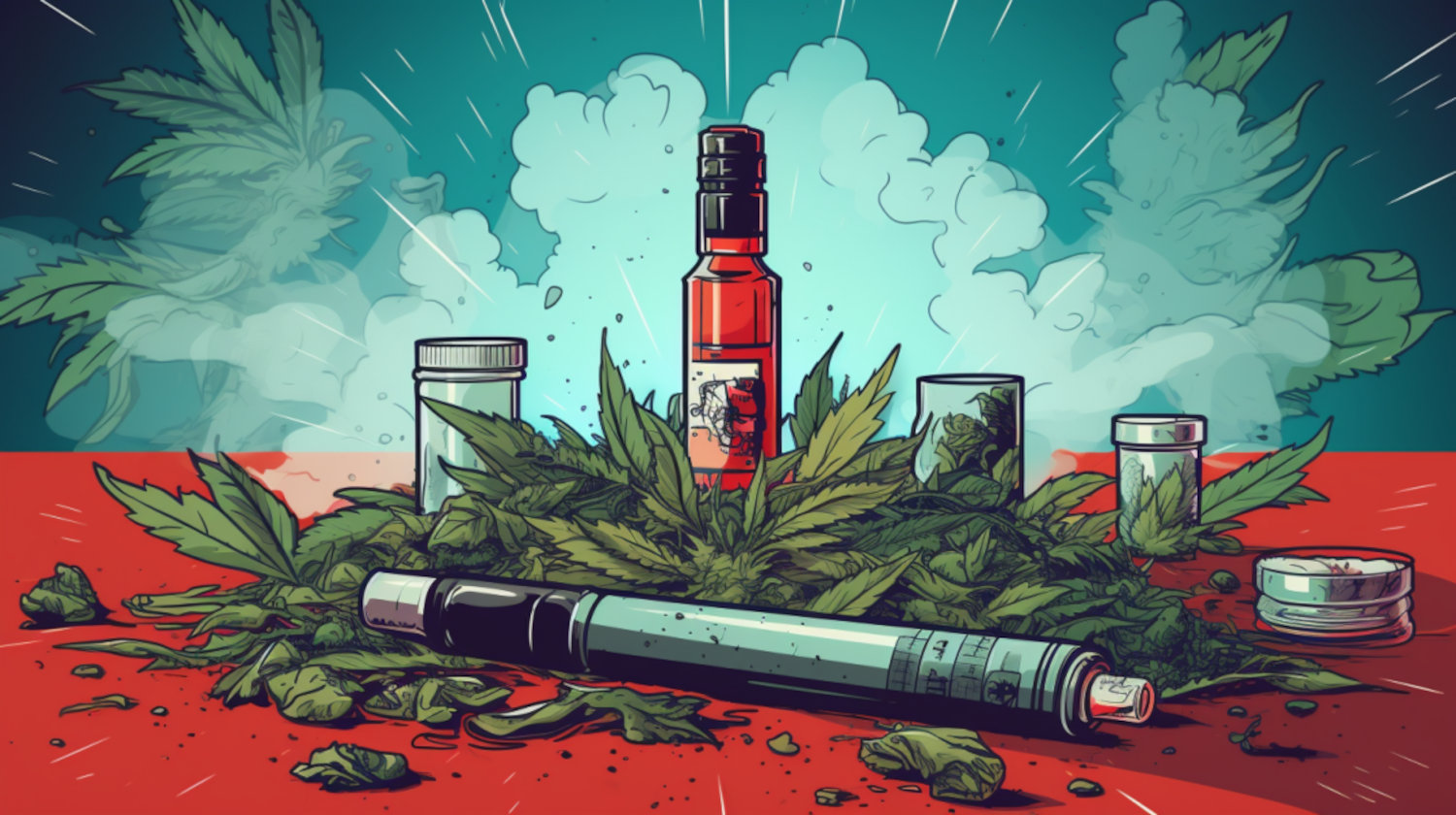In This Article
- What is CBN?
- How Far Back Does CBN’s History Go?
- Is CBN Synthetic?
- How Does CBN Affect the Body?
- What is THC?
- How Far Does THC's History Go Back?
- Is THC Synthetic?
- How Does THC Affect the Body?
- Comparing THC vs CBN Effects
- Effects of CBN vs THC
- Differences Between CBN and THC
- CBN and THC: Legality and Availability
- What Types of CBN and THC Products Are Available?
- Papa & Barkley
- LEVEL
- Kiva Confections
- References
Key Takeaways
- THC is found naturally in the cannabis plant, while CBN forms when THC breaks down.
- THC offers numerous potential benefits, and CBN may help with sleep, inflammation, and pain.
- THC products are much more common, but CBN products are gaining popularity for sleep.
With over 100 cannabinoids, consumers are quick to compare new ones to the ones they know and love. For example, THC (tetrahydrocannabinol) and CBD (cannabidiol) are staples, so they're the most common for comparisons. One notable comparison continuing to gain traction is CBN vs THC.
Over time, THC breaks down into CBN (cannabinol), and the newly transformed cannabinoid takes on new effects. How do those effects compare to THC, though? It's a question that continues to garner interest in the cannabis community.
Understanding the differences between CBN and THC is important for patients and consumers alike.
What is CBN?
When delta-9 THC is exposed to air, over time, a chemical reaction called oxidation occurs. During this process, THC transforms into CBN through a chemical change called aromatization.
In simpler terms, THC breaks down if it's left out because it's exposed to oxygen. The result is the CBN cannabinoid, or cannabinol, which is mildly intoxicating. It's why CBN is often referred to as a degradation product or artifact of delta-9 THC.1
Interestingly, we can find many phytocannabinoids in various plants and fungi. Meanwhile, CBN has only been discovered in the cannabis plant.
How Far Back Does CBN’s History Go?
CBN is one of the most famous minor phytocannabinoids. It also has the longest history, dating back to 750 BC. Seeds still containing high levels of CBN were found in a tomb in the Xinjiang region.
The cannabinoid was also the first isolated from hashish in the late 19th century. However, it wouldn't be fully solved until 1940, though it's been in high regard from the 1940s to the present day.1
Is CBN Synthetic?
Typically, CBN in high-CBN or CBN isolate products is semi-synthetic. While it is present in cannabis, it's in such limited quantities within fresh flowers that natural extraction delivers yields too low.
How Does CBN Affect the Body?
CBN's ability to bind to CB1 receptors is ten times lower than delta-9 THC's ability. Its activity on our CB2 receptors varies, though. Studies report a potency between two to four times lower than THC.
The compound also triggers a response in certain receptor channels throughout the body. These channels play roles in temperature and pain regulation, among a plethora of other essential functions. One of these key functions is sleep, which helps explain why CBN for sleep products is becoming more popular.1 In a comparison of CBD vs CBN, some consumers may lean towards the latter.
What is THC?

Delta-9 THC might be the most well-known cannabinoid to date. It holds notoriety for its intoxicating effects. These include:
- Euphoria
- Relaxation
- Altered senses
- An increased appetite
THC also continues to gain fame for its therapeutic potential. The FDA (US Food and Drug Administration) has approved forms of THC for specific medical conditions.
How Far Does THC's History Go Back?
Cannabis seeds containing THC followed the migration of nomadic peoples some 12,000 years ago. The joint migration helped humans and the cannabis plant both propagate the planet.
However, the structure of THC wasn't discovered until 1964. Dr. Raphael Mechoulam and his colleague, Dr. Yechiel Gaoni, discovered THC as the main intoxicating compound in cannabis. This discovery opened doors to discover the endocannabinoid system and cannabinoids' potential therapeutic uses.
Unfortunately, it was just before the golden age of cannabis came to an end in 1970. It was then that the United States declared cannabis as a Schedule I drug. Research into its effects became practically impossible in the 1970s and 1980s.2
Is THC Synthetic?
THC is naturally in the resin glands of the cannabis plant, which are known as trichomes. These trichomes are most abundant in the female flowers of the plant.
However, THC can also be semi-synthetic if it's instead produced by converting CBD.
How Does THC Affect the Body?
THC can bind to both CB1 and CB2 cannabinoid receptors in the body. While THC's affinity is strong for CB1 receptors, it's weaker for CB2.
Researchers attribute THC's ability to bind to CB1 receptors in the central nervous system to some of its effects. These include THC's influence on nausea, pain, and appetite. Its binding to CB2 receptors may result in anti-inflammatory, anti-spasmodic, and neuroprotective effects.
Comparing THC vs CBN Effects
Cannabinol (CBN) and tetrahydrocannabinol (THC) are two cannabinoids with distinct effects on the human body. Understanding THC vs CBN is essential for the consumers that seek either.
Effects of CBN vs THC
According to current research, CBN may help with pain management. It may act as an anti-inflammatory agent and an analgesic (a medication that relieves pain).
CBN also shows promise in possibly treating glaucoma symptoms. It does this by reducing inflammation that otherwise elevates intraocular pressure. In addition, preliminary studies suggest that CBN is an antioxidant. The cannabinoid may reduce cell damage associated with Huntington's disease.
Likewise, CBN exhibits antibacterial properties. It may be effective against even antibiotic-resistant bacteria like MRSA. Further research suggests CBN may stimulate appetite, increasing food consumption and feeding times.
Although research is ongoing, CBN's sleep-inducing properties could be unsubstantiated. From a clinical perspective, CBN's ability to help with sleep remains inconclusive. However, some studies do suggest that CBN combined with THC could increase sleep time.1
Finally, many phytocannabinoids activate the anandamide receptors in the brain. These receptors interact with our endocannabinoid system. By activating them, some cannabinoids, including CBN, might increase dopamine levels. Researchers have even suggested that CBN may help with symptoms of ADHD as it may work similarly to standard ADHD medications.3
Meanwhile, THC is known to induce feelings of euphoria and relaxation. As an intoxicating compound, it can also lead to unpleasant effects. These adverse symptoms can include memory impairment, apathy, depression, anxiety, and paranoia.4
THC is widely used for medical and recreational purposes alike. Medical patients consume cannabis products with a higher THC content for a variety of reasons. These include relieving symptoms of pain, anxiety, stress, trouble sleeping, and more.
Differences Between CBN and THC
CBN shows promise as a pain-relieving, anti-inflammatory, antioxidant, and antibacterial compound. It may stimulate appetite, ease symptoms for certain conditions, and have potential sleep-inducing effects.1
While CBN may be intoxicating, it’s only mildly intoxicating, especially compared to THC.
THC induces feelings of euphoria and relaxation but may lead to adverse effects in some consumers. These adverse effects are more prevalent and diverse than those associated with CBN.
THC and its variants are the most intoxicating compounds in the cannabis plant.
CBN and THC: Legality and Availability

It's easy to see how much the two cannabinoids differ. THC and CBN also have different laws and regulations across the market.
First, THC is only legal in adult-use cannabis states or states with high THC allowances in their medical program. Other states only have low-THC oil or CBD oil-only medical laws that won't typically allow THC.
Meanwhile, limited laws specify the legality of the CBN cannabinoid. However, some states have banned hemp-derived intoxicating compounds, which may include CBN. Other states, like CBN gummies and other hemp-derived edibles, may have laws on specific products.
Hemp-derived cannabinoids are in a gray area, for the most part. While they're technically illegal, there's a lack of enforcement for the products.
Oregon, for example, has banned CBN sales outside of dispensaries. Unless approved by the FDA, semi-synthetic CBN won't be sold in dispensaries.
The legality of each affects its accessibility. In states where THC is legal for recreational or medical use, it's more accessible through dispensaries. Regulations surrounding CBN can affect its availability, too. Always check state laws before purchasing cannabis products to ensure compliance with local regulations.
What Types of CBN and THC Products Are Available?

When it comes to CBN and THC products, the market offers a variety of options. These options help cater to different preferences and needs, like those who prefer to use CBN for sleep or THC for symptom relief.
Here's a look at the type of products widely available to compare CBN vs THC.
CBN products are relatively new to the market, at least compared to THC products. As a result, there are fewer options available. The market for CBN is still developing, so new products are introduced every day.
Meanwhile, THC products are abundant in recreational and high-THC medical states. These cannabis products come in a massive range of options. From edibles, tinctures, flower, and weed carts, the THC market offers something for everyone.
How easy it is to find products containing either CBN, THC, or both depends heavily on where one lives. In some states where THC isn’t legal for medical or recreational purposes, CBN products might be easier to acquire. Conversely, CBN is more highly regulated in some legal states, like Oregon.
The following products contain either just CBN or a combination of CBN, CBD, and/or THC.
Papa & Barkley
A well-known name in the industry, Papa & Barkley carries CBN:CBD federally legal CBN products, as well as CBN:THC products in the legal adult-use market.
Their Sleep Releaf CBD and CBN gummies are designed to help promote sleepiness naturally. The brand strives for quality, and its products are vegan, solventless, and crafted in small batches. A 100% satisfaction guarantee backs its products.
Meanwhile, Papa & Barkley’s Elderberry Sleep Releaf gummies contain CBD, CBN, and THC. They use the same signature whole-plant, solventless extraction process, simply with the addition of THC. The aim is to help consumers promote sleepiness, rest easier, stay asleep longer, and wake up feeling refreshed.
LEVEL
CBN-only products are hard to come by, which is part of what makes LEVEL’s CBN tablets so unique. These CBN tablinguals may help nudge consumers to sleep or at least chill down symptoms of jittery anxiety. The tablets are meant to sit under the tongue to dissolve for a convenient and fast-acting experience. Other products from LEVEL include tinctures, edibles, and more.
Kiva Confections
Kiva Confections is an esteemed brand with a diverse product line in the nation's recreational market. Switching it up from gummies, Kiva offers cannabis-infused vegan fruit chews, too. Their Boysenberry Chews offer a 10:5 THC:CBN formula. With a delightful blend of flavor and effects, it’s a go-to for some consumers.
References
- Maioli C, Mattoteia D, Amin HIM, Minassi A, Caprioglio D. Cannabinol: History, Syntheses, and Biological Profile of the Greatest "Minor" Cannabinoid. Plants (Basel). 2022;11(21):2896. Published 2022 Oct 28. doi:10.3390/plants11212896 ↩︎
- Crocq MA. History of cannabis and the endocannabinoid system . Dialogues Clin Neurosci. 2020;22(3):223-228. doi:10.31887/DCNS.2020.22.3/mcrocq ↩︎
- Dawson DA, Persad CP. Targeting the Endocannabinoid System in the Treatment of ADHD. Genetics & Molecular Medicine. 2021;3(1). doi:https://doi.org/10.33425/2689-1077.1006 ↩︎
- Martin-Santos R, Crippa JA, Batalla A, et al. Acute effects of a single, oral dose of d9-tetrahydrocannabinol (THC) and cannabidiol (CBD) administration in healthy volunteers. Current pharmaceutical design. 2012;18(32):4966-4979. doi:https://doi.org/10.2174/138161212802884780 ↩︎
The information in this article and any included images or charts are for educational purposes only. This information is neither a substitute for, nor does it replace, professional legal advice or medical advice, diagnosis, or treatment. If you have any concerns or questions about laws, regulations, or your health, you should always consult with an attorney, physician or other licensed professional.




